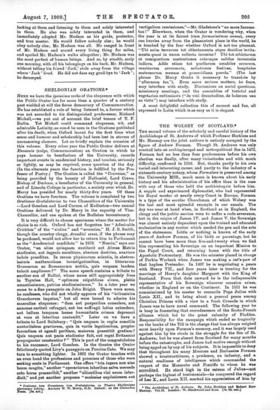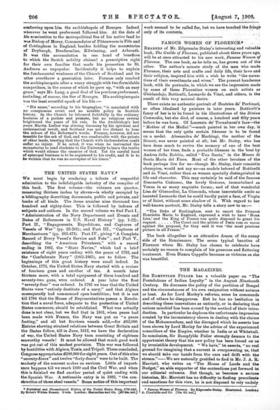THE WOLSEY OF SCOTLAND.*
THE second volume of the scholarly and careful history of the Archbishops of St. Andrews of which Professor Herkless and Mr. Hannay are the joint authors is entirely occupied by the figure of Andrew Forman. Though St. Andrews was only erected into an archiepiscopal and metropolitical See in 1472, Forman had no less than four predecessors before his own election was finally, after many vicissitudes and with much difficulty, confirmed in 1516. But, thanks partly to his own varied and interesting career, and partly to the industry of a sixteenth-century notary, whose Formulare is preserved among the University MSS., much more is known about his early history and his administration of his office than is the case with any of those who held the archbishopric before him. A supple and experienced diplomatist, who had represented his Royal master at nearly every Court in Europe, Forman is a type of the secular Churchman of which Wolsey was the last and most splendid example in our annals. The day was near at hand when, in Scotland as in England, the clergy and the public service were to suffer a rude severance, but in the reigns of James IV. and James V. the Sovereign was almost entirely dependent upon the trained and educated ecclesiastics in any matter which needed the pen and the arts of the statesman. Little or nothing is known of the early years of Andrew Forman, of his birth or parentage, but he cannot have been more than five-and-twenty when we find him representing his Sovereign on an important Mission to the Papal Court, and returning home with the title of Apostolic Protonotary. He was the minister placed in charge of Perkin Warbeck when James was making a cat's-paw of that hapless Pretender. In 1497 he is negotiating a peace with Henry VII., and four years later is treating for the marriage of Henry's daughter Margaret with the King of Scotland. From that date onward ho is the indispensable representative of his Sovereign wherever occasion arises, whether in England or on the Continent. In 1511 be was commissioned by his master to reconcile Pope Julius with Louis XII., and to bring about a general peace among Christian Princes with a view to a fresh Crusade in which James was to have naval command. The following year he is busy in fomenting that recrudescence of the Scoto-French alliance which led to the great calamity of Flodden. Responsibility for the campaign which ended so tragically on the banks of the Till is the charge that has always weighed mcst heavily upon Forman's memory, and it was largely used against him by his rivals in the struggle for the See of SL Andrews; but he was absent from Scotland for many months before the catastrophe, and James had motive enough without being egged on by any of hie subjects. It is impossible to deny that throughout his many Missions and Embassies Forman showed a trustworthiness, a prudence, an industry, and a natural readiness of intelligence which commanded the respect of the Monarchs and Pontiffs to whom he was accredited. He stood high in the esteem of Julius—not perhaps the highest of testimonials—he conquered the regard of Leo X., and Louis XII. marked his appreciation of him by • The Archbishops of St. Andrews. By John Rertlese and Robert Kerr Hannay, Vol.II. London: W. Blackwood and Sous. [7a. 6d. wt.]
conferring upon him the archbishopric of Bourges. Indeed wherever he went preferment followed him. At the date of his nomination to the metropolitical See of his native land be was Bishop of Moray, Commendator of Pittenweem in Fife and Cottingham in England, besides holding the monasteries of Dt'yburgb, Dunfermline, Kilwinning, and Arbroath. It was this accumulation in one hand of benefices to which the Scotch nobility claimed a prescriptive right for their own families that made his promotion to St.
Andrews so unpopular. Incidentally it helps to explain the fundamental weakness of the Church of Scotland and its utter overthrow a generation later. Forman only reached the archiepiscopate after a weary struggle with two formidable competitors, in the course of which be gave up, " with an easy grace," says Mr. Lang, a good deal of his previous preferment, including, of course, the See of Bourges. His arcbiepiscopatc was the least eventful epoch of his life :—
" His name," according to his biographer, "is associated with no conspicuous event and no notable policy in Scottish history. In the Church he laboured faithfully in the ordinary business of a prelate and primate, but •no religious revival brightened the years of his rule. In the Archbishop's last years Martin Luther was stirring Germany by his spiritual and ecclesiastical revolt, and Scotland was not too distant to hear the echoes of the Reformer's words. Forman, however, did not tremble for the ark of God, and was comfortable with the priests of other lands, trusting that the Church with its foundation could stiffer, ne injury. If he acted, it was when he instructed the Monasteries to send students to the University to learn the truths which would silence the enemies of God. Yet his careful heed of episcopal business is to be registered to his credit, and it is to be written that he was no corrupter of his times."







































 Previous page
Previous page